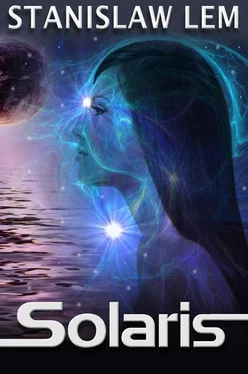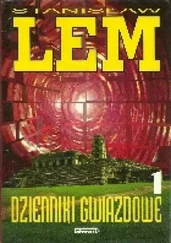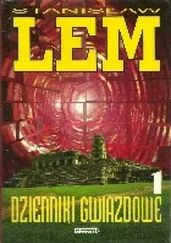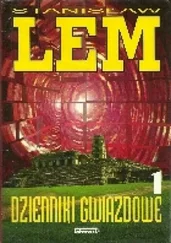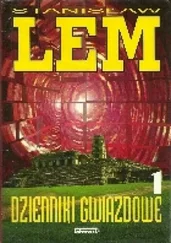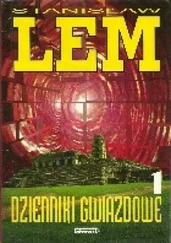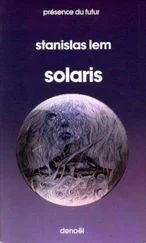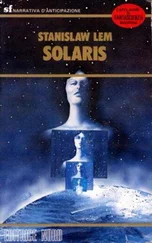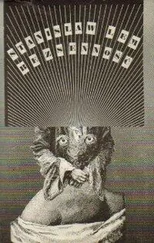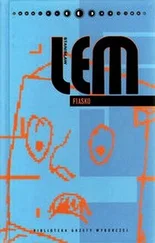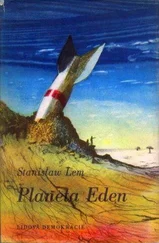“I’m… a very rarely seen member of the crew and that’s why…”—the pause extended dangerously—“I’ve not had the opportunity to make your acquaintance…” Harey smiled and put out her hand which he shook, it seemed to me, with a certain astonishment. He blinked several times and stood staring at her till I took him by the arm.
“Excuse me,” he said then to Harey. “I need a word with you, Kelvin…”
“Of course,” I replied with the ease of a man about town; it all sounded to me like cheap comedy, but there was nothing to be done. “Harey, darling, don’t mind us. Dr. Snaut and I have to talk about our boring scientific business.”
And I led him at once to some small armchairs on the other side of the room. Harey dropped into the chair she’d been sitting in before, but she pushed it around in such a way that she could see us when she raised her eyes from her book.
“What is it?” I asked softly.
“I got divorced,” he answered just as quietly, though his whisper had a sibillance about it. At one time I might have laughed at a story like that and such a conversation opener, but on the Station my sense of humor had been amputated. “I’ve lived through years since yesterday, Kelvin,” he added. “A good few years. What’s with you?”
“Not much,” I answered after a moment, because I didn’t know what to say. I liked him, but I sensed that at the present moment I needed to be on my guard with him, or rather with what he had come to me about.
“Not much?” he replied in the same tone as me. “I see, so that’s how things are…?”
“What do you mean?” I said, pretending I didn’t understand. He narrowed his bloodshot eyes and, leaning in so close I could feel the warmth of his breath on my face, he whispered:
“We’re bogged down, Kelvin. I can’t get a hold of Sartorius anymore, all I know is what I wrote you about what he said after that lovely little conference of ours…”
“He’s turned off his visuphone?” I asked.
“No. There’s a short circuit at his end. It looks like he did it deliberately, or maybe…” He made a movement with his fist as if he were smashing something. I looked at him without saying a word. The left corner of his mouth rose in a disagreeable smile.
“Kelvin, I came here because…”
He didn’t finish.
“What do you intend to do?”
“You mean the letter…?” I replied slowly. “I can do it. I see no reason to refuse. Actually that’s why I’m sitting here; I wanted to figure out—”
“No,” he interrupted, “I didn’t mean that…”
“No?” I said, feigning surprise. “Do tell.”
“It’s Sartorius,” he murmured after a short pause. “He thinks he’s found a way… you know.”
He kept his gaze fixed on me. I sat there calmly, striving to make my expression look indifferent.
“First there’s that business with the X-rays. What Gibarian was doing with them, remember. It’s possible to modify it somewhat…”
“How?”
“All they were doing was sending a bundle of rays into the ocean and modulating their intensity according to different formulas.”
“Yes, I know about that. Nilin did it too. And a whole bunch of others.”
“Right, but they used soft radiation. This was the hard stuff; they packed everything they had into the ocean, the whole nine yards.”
“That could have unpleasant consequences,” I remarked. “It’s a violation of the Convention of the Four, and of UN restrictions.”
“Kelvin… Don’t act dumb. That’s neither here nor there at this point. Gibarian’s dead.”
“Oh, so Sartorius is thinking of blaming the whole thing on him?”
“I don’t know. I haven’t talked to him about it. That’s not important. Sartorius reckons that since guests only appear when we wake up, it must be extracting the prescription to produce them while we’re asleep. It thinks our most important state is sleep, precisely. That’s why it does what it does. So Sartorius wants to send it our waking state — our conscious thoughts. You follow?”
“How? By mail?”
“Save the jokes for later. The bundle of rays will be modified with the brain waves of one of us.”
It all suddenly became clear to me.
“Oh,” I said. “And that one of us would be me. Right?”
“Yes. He was thinking of you.”
“I’m deeply grateful.”
“What do you say?”
I was silent. Without a word he took an unhurried look at Harey where she sat immersed in her reading, then turned his gaze back to me. I felt I was turning pale; I couldn’t stop myself.
“Well?” he said.
I shrugged.
“All those X-ray sermons about the wonderfulness of humankind — that’s all nonsense in my view. Yours, too. Or am I wrong?”
“Really?”
“Really.”
“Very well then,” he said and smiled, as if I’d granted his wish. “So you’re opposed to this business of Sartorius’s?”
I didn’t yet understand what had happened, but from his expression I realized that he’d led me exactly where he wanted to. I didn’t speak — what could I have said at that juncture?
“Excellent,” he said. “Because there’s also another project. To adapt a Roche machine.”
“An annihilator…?”
“Yes. Sartorius has already carried out the preliminary calculations. It’s doable. It won’t even require a lot of power. The machine will run twenty-four hours a day or for an unlimited time, to create an antifield.”
“W…wait! How do you envisage that?!”
“It’s very simple. It’ll be a neutrino antifield. Ordinary matter will remain untouched. The only thing to be destroyed will be… neutrino systems. You understand?”
He gave a satisfied smile. I sat there with my mouth agape. The smile gradually disappeared from his face. He frowned at me searchingly and waited.
“So Project Thought, the first one, we’re rejecting that. Right? And the second one? Sartorius is working on it already. We’re going to call it Project Freedom.”
I closed my eyes for a moment. I’d suddenly made up my mind. Snaut was not a physicist. Sartorius had turned his visuphone off or broken it. Very well.
“I’d call it rather Project Butchery,” I said slowly.
“You were a butcher yourself. Am I not right? Now things will be quite different. No guests, no G-formations — nothing. The moment the materialization appears, it’ll disintegrate.”
“You misunderstand,” I replied, shaking my head with a smile that I hoped looked sufficiently natural. “These aren’t moral scruples, they’re a survival instinct. I don’t want to die, Snaut.”
“What…?”
He was taken aback. He gave me a suspicious look. From my pocket I pulled out the crumpled sheet of paper containing the formulas.
“I’ve been thinking about it too. Does that surprise you? After all, I was the first one to propose the neutrino hypothesis, you won’t deny that? So look: an antifield can be built. For ordinary matter it’s harmless. That much is true. But at the moment of destabilization, when the neutrino system begins to disintegrate, the energy of its bonds will be released as surplus. If we assume ten to the eighth ergs for every kilogram of rest mass, for one G-formation we get between five and seven times ten to the eighth. Do you know what that means? The equivalent of a small uranium charge going off inside the Station.”
“What are you saying! But… surely Sartorius must have taken that into consideration…”
“Not necessarily,” I retorted with a malicious smile. “The thing is, Sartorius belongs to the Frazer and Cajolli school. According to them, at the moment of disintegration the entire energy of the bonds is released in the form of light radiation. There’d be just a powerful flash, maybe not completely safe, but not destructive. But there are other hypotheses, other theories of the neutrino field. According to Cayatt, according to Avalov, to Siona, the emission spectrum is much broader, with the maximum occurring as hard gamma radiation. It’s very nice that Sartorius trusts his masters and their theory, but there are others, Snaut. And you know what else?” I went on, seeing that my words had made an impression on him. “The ocean also needs to be taken into consideration. If it did what it did, for sure it used the best possible method. In other words: its activities seem to me an argument in favor of the other school and against Sartorius.”
Читать дальше
